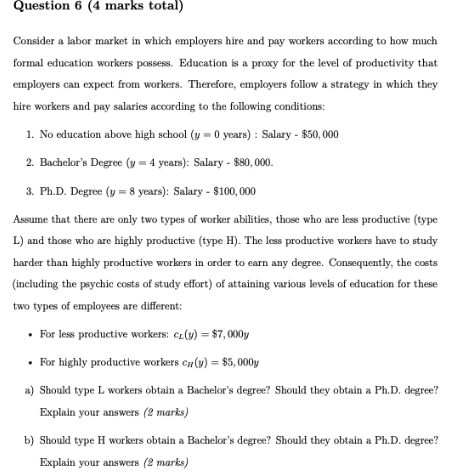
Question 6 (4 marks total) Consider a labor market in which employers hire and pay workers according to how much formal education workers possess. Education is a proxy for the level of productivity that employers can expect from workers. Therefore, employers follow a strategy in which they hire workers and pay salaries according to the following conditions: 1. No education above high school (y = 0 years) : Salary - $50,000 2. Bachelor's Degree (y = 4 years): Salary - $80,000. 3. Ph.D. Degree (y = 8 years): Salary - $100,000 Assume that there are only two types of worker abilities, those who are less productive (type L) and those who are highly productive (type H). The less productive workers have to study harder than highly productive workers in order to earn any degree. Consequently, the costs (including the psychic costs of study effort) of attaining various levels of education for these two types of employees are different: . For less productive workers: cz(y) = $7,000 For highly productive workers Ca(y) = $5,000y a) Should type L workers obtain a Bachelor's degree? Should they obtain a Ph.D. degree? Explain your answers (2 marks) b) Should type H workers obtain a Bachelor's degree? Should they obtain a Ph.D. degree? Explain your answers (2 marks) Question 6 (4 marks total) Consider a labor market in which employers hire and pay workers according to how much formal education workers possess. Education is a proxy for the level of productivity that employers can expect from workers. Therefore, employers follow a strategy in which they hire workers and pay salaries according to the following conditions: 1. No education above high school (y = 0 years) : Salary - $50,000 2. Bachelor's Degree (y = 4 years): Salary - $80,000. 3. Ph.D. Degree (y = 8 years): Salary - $100,000 Assume that there are only two types of worker abilities, those who are less productive (type L) and those who are highly productive (type H). The less productive workers have to study harder than highly productive workers in order to earn any degree. Consequently, the costs (including the psychic costs of study effort) of attaining various levels of education for these two types of employees are different: . For less productive workers: cz(y) = $7,000 For highly productive workers Ca(y) = $5,000y a) Should type L workers obtain a Bachelor's degree? Should they obtain a Ph.D. degree? Explain your answers (2 marks) b) Should type H workers obtain a Bachelor's degree? Should they obtain a Ph.D. degree? Explain your answers (2 marks)







